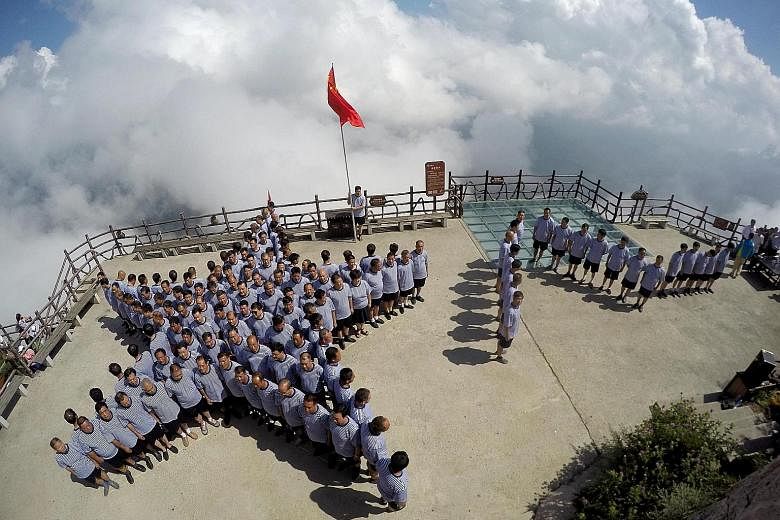BEIJING • Chinese President Xi Jinping is paying soldiers to leave the world's largest army, and to do so quietly.
Military personnel have been getting generous buyouts to retire early, according to people with knowledge of the matter, a move that shows both the People's Liberation Army's (PLA's) importance to the ruling Communist Party and the hurdles facing Mr Xi as he seeks to overhaul it.
Packages include severance payments worth tens of thousands of dollars and promises to keep paying some soldiers as much as 80 per cent of their pre-retirement wages, said the people, who asked not to be identified because the plan has not been publicly announced.
The buyouts are meant to speed Mr Xi's push to shed 300,000 troops from the 2.3 million-member military, the centrepiece of China's biggest shake-up of the PLA since the early days of the Cold War. They also reduce the risk that demobilised troops end up disgruntled and on the streets, creating a new source of unrest at a time of slowing growth.
How much the military buyouts will cost and what portion of the 300,000 demobilised troops are expected to qualify is unclear.
The government plans to set aside as much as 100 billion yuan (S$20 billion) to help resettle about 1.3 million coal workers and half a million steel workers.

Under the plan, a senior colonel who agrees to do his own job-searching could be eligible for a one-time payment of about one million yuan, in addition to as much as 80 per cent of his salary, according to the people with knowledge of the matter. Chinese media have reported that PLA officers earn between 4,000 yuan and 20,000 yuan a month.
The plan allows officers to factor in time spent at university, the people said. It also provides compensation for relocation. Former soldiers would be exempt from business and income taxes if they are self-employed.
The buyout's generosity underscores the special status of the PLA, which has been the ultimate guarantor of party rule since the country's founding. Those bonds make demonstrations or grievances involving former soldiers particularly sensitive to the government, and such issues are rarely discussed in public.
Mr Xi, who also leads the party's Central Military Commission, told a meeting last November that the authorities must "provide special measures and favoured policies to proactively help ex-soldiers settle down", the official Xinhua News Agency reported. Local governments and Chinese companies have touted efforts to help manage any fallout from the restructuring.
The authorities have already ordered state-owned enterprises to hire former soldiers, in part to ensure "social harmony and stability".
Yizheng city, in the eastern province of Jiangsu, warned last year that officials would be punished if former soldiers petitioned or demonstrated and caused "serious consequences and damage to social stability". Didi Chuxing, China's largest ride-hailing service, said the company had as of May trained 179,000 former soldiers to become drivers.
Mr Yue Gang, a retired colonel, said: "Soldiers are less adapted to society because they may not have the skills that the job market wants and not be familiar with workplace culture. And that's why they need more support from the government."
Softening the blow from job cuts has emerged as a key concern as the party shifts the economic focus from investment and manufacturing to innovation and services. The push threatens to exacerbate labour unrest amid China's slowdown, with more than 1,450 worker actions recorded by Hong Kong-based activist group China Labour Bulletin in the first six months of the year, a 19 per cent increase over last year.
Dr Xue Gangling, dean of the China University of Political Science and Law, told a May 2013 seminar that protests involving former soldiers were among the country's biggest potential risks to stability, Caixin magazine reported at the time. Dr Xue said bureaucratic mismanagement contributed to an almost fivefold increase in such demonstrations annually between 2002 and 2004, rising to 140.
BLOOMBERG

